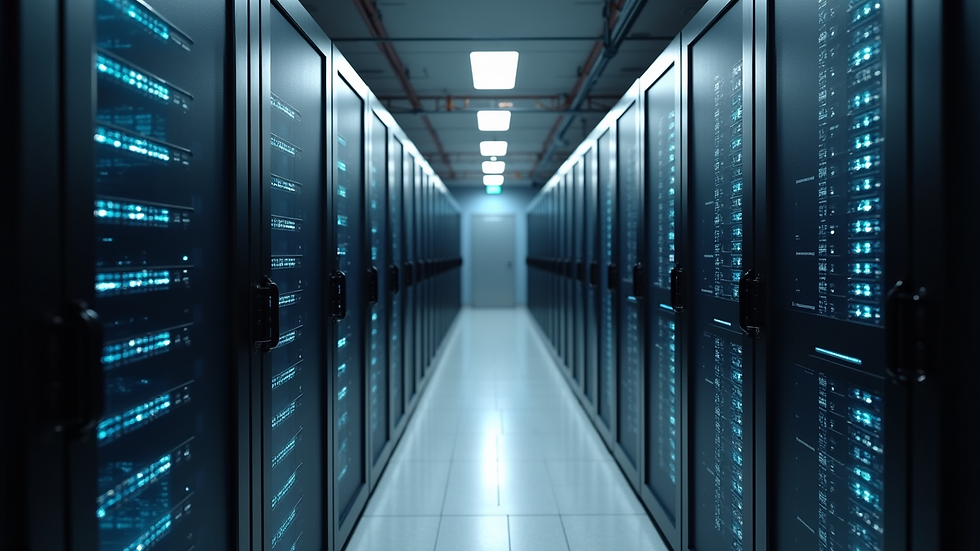The Essential Role of Modern Networking Equipment and Cyber Security for Small Businesses
- matkon99
- Sep 17
- 3 min read
In today's fast-paced digital world, small businesses encounter unique challenges, especially in adopting new technology. Networking equipment and cyber security are the foundational elements that can keep these businesses operational and competitive. With technology rapidly changing, staying equipped with modern networking tools and strong cyber security measures is essential for success.
The Need for Modern Networking Equipment
Investing in modern networking equipment is vital for establishing a reliable business setup. Old hardware can lead to serious issues like slow internet speeds, inefficiencies, and increased downtime, which can impact both productivity and customer satisfaction.
For instance, a study found that businesses using outdated routers experienced an average slowdown of 50% in their internet speed during peak hours. This lag can frustrate customers and hinder employees from working efficiently.
Modern devices such as routers, switches, and access points are designed to handle today’s demands, including cloud computing and video conferencing. They provide enhanced performance and better security features, ensuring reliable connectivity. Upgrading your equipment can support higher bandwidths. This allows more users and devices to connect without a drop in performance, which is especially important as remote work becomes more common.

Cyber Security: A Critical Component
As small businesses depend more on technology, the importance of cyber security grows. Cyber threats are increasingly common, and small businesses are often targeted because they may lack robust defenses. For example, a 2023 report showed that 43% of cyber attacks target small businesses, and the average cost of a data breach for a small business can reach about $200,000.
To protect sensitive information and ensure smooth operations, implementing strong cyber security measures is essential. This should include firewalls, antivirus software, and intrusion detection systems aimed at blocking unauthorized access and malware.
Additionally, educating employees about cyber security best practices is crucial. Human error can often lead to security breaches, so training staff to identify phishing emails and suspicious activities can drastically lower the risk of an attack.
The Intersection of Networking Equipment and Cyber Security
The relationship between modern networking equipment and cyber security is critical. Advanced routers and switches typically include built-in security features that provide protection against potential cyber threats. For example, network segmentation allows businesses to isolate sensitive data, which decreases vulnerability.
Regular updates and patches are also necessary to maintain security. Manufacturers regularly release updates to fix vulnerabilities. Failure to keep networking equipment current can expose businesses to significant risks.
Investing in both modern networking tools and solid cyber security creates a strong defense against cyber threats. This approach not only secures sensitive data but also boosts overall network performance.

Cost-Effectiveness of Upgrading Equipment
While the upfront costs of modern networking equipment and cyber security preparations might appear steep, the long-term advantages are substantial. Continuing to use old equipment may lead to constant repairs and costly downtime. A Business Insider analysis indicates that downtime can cost small businesses over $300,000 each year.
Upgrading to energy-efficient devices can not only lower utility bills but also support sustainability goals. Moreover, having a secure and efficient network allows employees to concentrate on their core tasks rather than struggle with technical issues, driving higher productivity and ultimately increasing profitability.
Compliance and Legal Considerations
In today's world, many industries require compliance with data protection regulations. Neglecting to implement solid cyber security can lead to legal consequences and hefty fines. Investing in modern networking equipment and effective cyber security protects businesses from potential legal trouble and fines that can run into the millions.
By ensuring compliance with regulations like GDPR, HIPAA, or PCI DSS, small businesses do more than just avoid fines; they also build consumer trust. Demonstrating a commitment to data security can not only enhance a business's reputation but can also attract new clients.
Final Thoughts
It's clear that updated networking gear and strong cyber security are essential for small businesses. As technology continues to advance, so do the risks involved. Investing in the latest networking solutions and solid cyber security measures is crucial for protecting valuable data, ensuring compliance, and maintaining efficient operations.
Small businesses that emphasize these factors will not only safeguard their assets but will also be better positioned for growth in an increasingly digital landscape. By staying proactive and informed, small businesses can tackle the challenges of technology head-on and emerge even stronger.



Comments